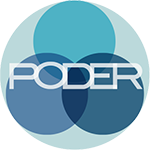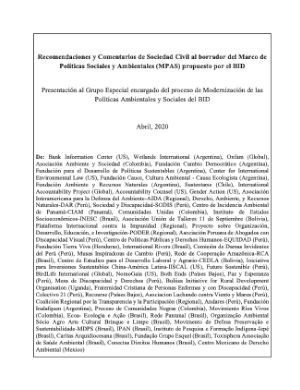The Inter-American Development Bank submitted its Social and Environmental Policy Framework for review and consultation.
The Project on Organizing, Development, Education, and Research (PODER) in collaboration with a group of civil society organizations, made observations and recommendations to the IDB’s policy framework. The latter, so their borrowers strengthen actions to respect and protect human rights, transparency, accountability, complaint mechanisms, access to information processes, and effective participation of communities. The objective is that the IDB will consider these factors in the process of analysis of project viability and how each project may have an impact on them.Our vision is that development projects will benefit all people and communities, and not only to a small group of interest. We, as civil society organizations, advocate that development projects should favour a healthy environment, and that prevention of damage and reparation should be foreseen.We trust that the IDB will heed this call to update their environmental and social safeguards to broaden their scope. It is important the IDB monitors and supervises their borrowers actions, and sanction bad practices, to finance projects in the region that truly achieve the reduction of poverty and inequality while respecting human rights and the environment.
From: From: Bank Information Center (US), Wetlands International (Argentina), Oxfam (Global), Asociación Ambiente y Sociedad (Colombia), Fundación Cambio Democrático (Argentina), Fundación para el Desarrollo de Políticas Sustentables (Argentina), Center for International Environmental Law (US), Fundación Cauce, Cultura Ambiental – Causa Ecologista (Argentina), Fundación Ambiente y Recursos Naturales (Argentina), ONG Sustentarse (Chile), International Accountability Project (Global), Accountability Counsel (US), Gender Action (US), Asociación Interamericana para la Defensa del Ambiente-AIDA (Regional), Derecho, Ambiente, y Recursos Naturales-DAR (Peru), Sociedad y Discapacidad-SODIS (Peru), Centro de Incidencia Ambiental de Panama-CIAM (Panama), Comunidades Unidas (Colombia), Instituto de Estudos Socioeconômicos-INESC (Brazil), Asociación Unión de Talleres 11 de Septiembre (Bolivia), Plataforma Internacional contra la Impunidad (Regional), Proyecto sobre Organización, Desarrollo, Educación, e Investigación-PODER (Regional), Asociación Peruana de Abogados con Discapacidad Visual (Perú), Centro de Políticas Públicas y Derechos Humanos-EQUIDAD (Perú), Fundación Tierra Viva (Honduras), International Rivers (Brazil), Comisión de Damas Invidentes del Perú (Peru), Musas Inspiradoras de Cambio (Peru), Rede de Cooperação Amazônica-RCA (Brazil), Centro de Estudios para el Desarrollo Laboral y Agrario-CEDLA (Bolivia), Iniciativa para Inversiones Sustentables China-América Latina-IISCAL (US), Futuro Sostenible (Peru), BirdLife International (Global), NomoGaia (US), Both Ends (Netherlands), Paz y Esperanza (Peru), Mesa de Discapacidad y Derechos (Peru), Buliisa Initiative for Rural Development Organisation (Uganda), Fraternidad Cristiana de Personas Enfermas y con Discapacidad (Peru), Colectivo 21 (Peru), Recourse (Netherlands), Asociacion Luchando contra Viento y Marea (Peru), Coalición Regional por la Transparencia y la Participación (Regional), Andares (Peru), Fundación Inalafquen (Argentina), Proceso de Comunidades Negras (Colombia), Movimiento Rios Vivos (Colombia), Ecoa- Ecologia e Ação (Brazil), Rede Pantanal (Brazil), Organização Ambiental Sócio Agro Arte Cultural Brinque e Limpe (Brazil), Movimento de Defesa Preservação e Sustentabilidade-MDPS (Brazil), IPAN (Brazil), Instituto de Pesquisa e Formação Indígena-Iepé (Brazil), Caritas Arquidiocesana (Brazil), Fundação Grupo Esquel (Brazil), Toxisphera Associação de Saúde Ambiental (Brazil), Conectas Direitos Humanos (Brazil), Centro Mexicano de Derecho Ambiental (Mexico).

